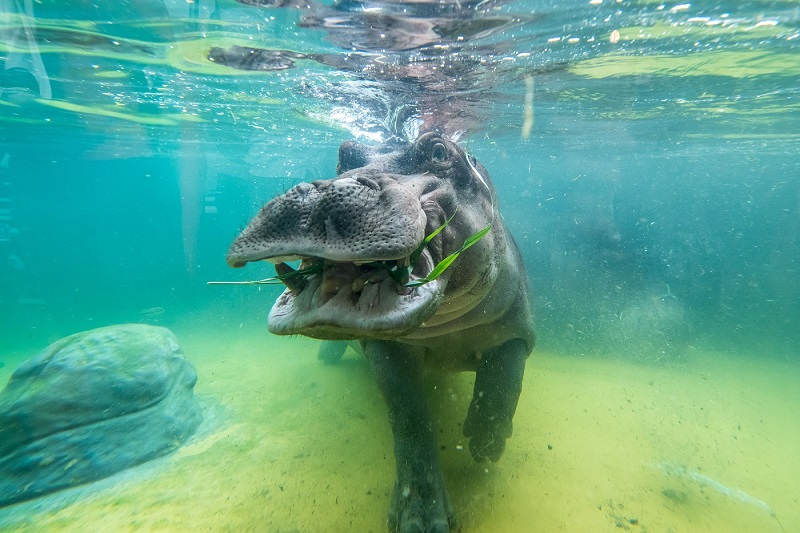
Collapsing hippo numbers – and the loss of dung they produce – poses a threat to the species that thrive in eastern Africa’s rivers and great lakes, and the humans who rely on them.
‘In the long run there is probably going to be a problem,’ warn experts of the loss of silicon which nourishes Lake Victoria and provides food and jobs to communities.
Hippos‘ graze the grassy savannah at night, then spend their days lazing and defecating in rivers to avoid the hot sun.
Research, led by the University of Antwerp, along the Mara River has shown this helps sustain hundreds of species of fish and other life that dwell downstream in Lake Victoria by oxygenating waters.
Hippo’s are disappearing in alarming rate
But hippo numbers have been decimated by poaching for their teeth, habitat loss and conflict with humans with 95 per cent of hippos lost from some countries, according the the African Wildlife Foundation.
Hippos have all but disappeared along the tributaries that feed the great lakes of eastern Africa and this could have downstream consequences, researchers said.
“The nutrients in the excrements of most grazers largely end up back in the savannah again, where they are reabsorbed by the plants,” says biologist Dr Jonas Schoelynck lead author of the study published in Science Advances on Wednesday.
The Nutrient pump of Africa’s rivers and lakes
“This is not the case with hippos: they act as a kind of nutrient pump from the land to rivers and lakes.”
Hippos will consume around 40kg of grass a day, and these grasses are enriched with silicon, which is absorbed from groundwater and helps them remain tough, and protects them from pests and from smaller grazers.
Silicon is also a vital chemical for many water dwelling species, such as diatoms, a microscopic algae which are food for insects and small fish that underpin the food chain, and pump out oxygen to keep rivers habitable.
When silicon levels drop in rivers these diatom numbers collapse and this can cause a bloom of pest species and turn them into environmental dead zones.
Silicon has been assumed to get into rivers from soils, but Dr Schoelynck and colleagues found that hippo dung is responsible for three quarters (76 per cent) of the silicon transported along Tanzania’s Mara River to Lake Victoria.
“Our results are completely new,” says Dr Patrick Frings of German research centre, GFZ, adding that no one had thought grazing animals could play such a major role.
“This process is crucial for the entire land-water ecosystem,” he added. “In the past, however, it has simply been overlooked.”
As hippo populations across Africa fell by as much as 20 per cent between 1996 and 2004 – a period where poachers began using military-grade weapons and tactics.
They are expected to fall by a further third over the next 50 to 60 years and this could deplete even Lake Victoria’s rich reserves of nutrients and fish.
“In the long run there is probably going to be a problem,” said Dr Schoelynck. “If the diatoms do not get enough silicon, they are replaced by pest algae, which have all sorts of unpleasant consequences, such as a lack of oxygen and the associated death of fish.
“And fishing is an important source of food for the people of Lake Victoria.”
Source: Independent.co.uk
Written by: Alex Matthews-King
Learn more: Hippopotamus Dung Affects African Ecosystem
Subscribe for the GWW Newsletter


